Annual celebration: 3 new honorary doctorates & 2 new PhD degrees
On Friday 29 September, we had our traditional annual celebration, where Ilisimatusarfik was celebrated

On Friday 29 September, we had our traditional annual celebration, where Ilisimatusarfik was celebrated.
The annual celebration was marked with inspiring speeches and atmospheric songs, where we also honored our new honorary doctorates and awarded PhD degrees.
Rector Gitte Adler Reimer hosted the event, and chairwoman of the board Suzanne Møller delivered the annual celebration speech.
In addition, Ulla Fleischer gave a speech on behalf of the students.
You can read the speeches below.
3 new honorary doctorates
A special highlight during the annual celebration was the tribute to Ilisimatusarfik's 3 newly appointed honorary doctorates - for their professionalism and dedication, and who in their own way have contributed to society and science.
Ilisimatusarfik's 3 new honorary doctorates are:
Carl Christian (Puju) Olsen is new honorary doctorate at Ilisimatusarfik for his outstanding contribution to the Inuit languages - and for his dedication to strengthening the rights of Greenlandic speakers.
Throughout his life, he has been engaged in research on the Inuit languages and has worked tirelessly to preserve and promote their cultural and linguistic heritage.
His in-depth studies and publications on the Inuit languages have contributed significantly to our understanding of these unique languages.
Through her dissemination, Marianne Stenbæk has created lasting connections between university research and society - and between artists and researchers in Greenland and Canada and throughout the Arctic.
Marianne's way of creating research and dissemination that actively contributes to the Arctic communities' continued development towards increased self-determination and cultural sustainability justifies the award of the title of honorary doctorate at Ilisimatusarfik, where our values emphasize that the university must contribute to the development of society here in Greenland and the communities in the Arctic - with a special focus on sustainability and the rights of indigenous peoples.
Minik Rosing is an internationally recognized geologist and scientist whose research has shed light on Earth's early history.
His discoveries and theories on the early evolution of the Earth have had a global impact on the understanding of our planet's origins.
Minik Rosing is a new honorary doctorate at Ilisimatusarfik for his extraordinary contribution to the field of geology, and for his ability to explain and communicate complicated scientific topics in an easy-to-understand way.
We congratulate Carl Christian (Puju) Olsen, Marianne Stenbæk and Minik Rosing with the prestigious title of honorary doctorate at Ilisimatusarfik.
In addition to the honorary doctorate, the honorary doctorates also receive an emblem in Greenlandic gold.
You can read the speeches below.
2 new PhD degrees
At the annual celebration, we were also proud to award PhD degrees to two new PhDs:
Christine Ingemann is awarded the PhD degree for the PhD project "Putting families and local professionals at the heart of implementation research - a qualitative implementation study on Greenland's universal parenting program MANU 0-1 Year" at the Institute of Health & Nature.
Anna Maria Andersson is awarded the PhD degree for the PhD project “Investigation of atopic dermatitis in Greenland; distinct genotypes, phenotypes and immunotypes” at the Institute of Health & Nature.
Ilisimatusarfik congratulates both Christine and Anna Maria with their well-deserved PhD degrees.
After the ceremony, Ilisimatusarfik hosted a reception.
Dear Naalakkersuisoq, dear Ilisimatusarfik's board, dear employees and students, dear honored guests;
Welcome to this annual celebration, where we celebrate Ilisimatusarfik and Ilisimatusarfik's work. I would also like to extend a special welcome to our new students and staff.
Today we are gathered here to celebrate our founding, our triumphs, appreciate our fun moments and maybe even forget the times we tried to pull instead of pushing the door.
It's been a year filled with teaching, research, experiences, and a few unforeseen events.
We've seen our students dive into books and occasionally out of windows. But most importantly, students have gained knowledge and lessons that will benefit them on their forward career journey.
Dear students.
You are the future of Greenland and Ilisimatusarfik, and the most important resource - without you, Greenlandic society would not function.
Our researchers have been working around the clock to answer big questions in the world, especially big questions in relation to the Arctic and Greenlandic society that are of great international interest and attention.
In addition to the important questions, our researchers have again this year conducted excellent research.
You can read about it in the many international research magazines - but also in our very own Ilisimatusaat and our journal Greenlandic Culture and Social Research. With each publication, Ilisimatusaat and our journal delve into Greenland's treasure trove of knowledge. It is not only a platform for sharing the latest research, but also a window into Greenlandic society.
Ilisimatusarfik's research is important to Greenlandic society - just as Ilisimatusarfik is. Ilisimatusarfik is like a key to Greenlandic knowledge and opportunities. It is a place where curious minds can be explored, challenged, and developed.
Through teaching, research, and collaboration, Ilisimatusarfik helps shape future employees and leaders - and research and solve complex societal problems.
Ilisimatusarfik is the place where ideas are born and where society draws on intellectual wealth to drive progress and innovation.
Ilisimatusarfik is the cornerstone of Greenland's knowledge society - bridging generations, cultures, and global challenges.
But Ilisimatusarfik is nothing without our amazing technical-administrative staff, teachers, and researchers.
So, let's not forget our amazing employees who keep this university running, even when the photocopier decides to go on strike at exam time.
You are the true everyday heroes!
But today is not just about looking back on the moments that shaped the past year.
It's just as much about celebrating our collective efforts, our endless curiosity, and our ability to find joy even in the most challenging moments.
So, let's congratulate ourselves for all the late nights and early mornings, for all the books read and those used as coffee saucers.
Let's congratulate ourselves for the friendships that were made - for the knowledge that was shared - and for the unwavering belief that we can make a difference for Greenland and the entire Arctic.
Let's celebrate the coming year with just as much enthusiasm.
Congratulations on the past year, congratulations on the coming year - and let the celebrations begin!
Thank you for your attention - and thank you for celebrating this day with us - and happy anniversary to all.
Naalakkersuisoq, members of Inatsisartut, dear guests, dear employees, and dear students.
It is a great honor and pleasure to be allowed to speak here at Ilisimatusarfik's annual celebration.
Nothing is as important for a country as knowledge and education! Education and knowledge are important for all parts of a society, for health, living conditions, gross domestic product, integrity, politics and much more - therefore it is a great day when we today celebrate Ilisimatusarfik - the place for the highest knowledge, an institution that supports society - great words that can easily be said, but what does it really mean?
Ilisimatusarfik's work is socially beneficial by having a concrete impact on and contributing to large parts of society.
We educate school teachers who will shape your child's schooling, the nurses you meet when you get sick, the lawyers who will help to support the legal system, the historians who ensure we have knowledge about our past, the linguists who can ensure the preservation and development of our language, those who can translate from and into other languages, the journalists you see on your TV, the economists who ensure financial sustainability, the theologians you meet in church, the social workers who take care of citizens with special needs, we educate those who have knowledge about how a society works, we educate researchers - you meet our graduates in private, government-owned and public companies, departments, agencies and municipalities, and I could go on. Everywhere in society, you meet the people, citizens and professionals educated at Ilisimatusarfik.
Ilisimatusarfik contributes knowledge - not only through education, but also through research - research that specifically creates knowledge about how to ensure our elderly a good old age in changing times, how to treat your child with childhood eczema, what impact major political decisions will have on us in the Arctic, which education is the best for our children, what actually happened and was decided when young girls got IUDs, how to ensure against social inequality, what economic outcome political decisions will have for us ordinary people, etc.
So, being a societal educational institution is important for all of us, and it places a great responsibility on Ilisimatusarfik to contribute to the future development of society.
Ilisimatusarfik is fully aware of this responsibility, and therefore the word quality is a central focal point in the board's work. Quality can be seen on several levels, within the programs and research, where the management through various steering committees, employer panels and the board. Steering committees, employer panels and department and academic councils constantly ensure the social relevance and international level of the programs.
But quality in education is also about international recognition, which is why we look forward to the government setting up a quality assurance council with international experts who can ensure that Ilisimatusarfik undergoes the same process and recognition that we have seen at universities abroad.
Quality is also about ensuring the languages we use in research and education, which is why the introduction of a language policy has been extremely important, it ensures a conscious qualification of the area, and it is a pleasure that the first experiences with translation assistance at exams have been made and can be evaluated.
But many things are about finances and having the necessary resources. Therefore, it has been a high priority for the board to ensure a comprehensive upgrading of the entire financial area, it has been trimmed and completely transparent so that all decisions and prioritization are made on a completely well-informed basis.
In addition to the annual budget appropriation, Ilisimatusarfik receives quite significant external grants for research and development, therefore it is very important that we have a secure and transparent management of the financial resources, and that we are fully prepared to handle even larger grants in the future.
Ilisimatusarfik's continued development is of great value to society - not only in education and research but also in the economic area, external grants from abroad for research and development create jobs and support society. We must be fully aware of this, and we on the board are.
One of Ilisimatusarfik's very important focuses now and in the coming years is to ensure better and not least larger frameworks for all the many students and researchers who have their daily lives here at Ilimmarfik. The positive development that we have experienced over the past 15 years has increased the student mass quite significantly, we have more programs, and the Institute of Learning has moved here to campus Ilimmarfik - so there are challenges with space. Therefore, the board and management are working to raise funds for a campus II. It is a comprehensive process, a working group headed by Professor Morten Meldgaard has been set up and is working purposefully to seek external funding, currently working on the prospectus and the board has allocated DKK 200,000 seed money - and very generously we have received a grant from the Aage V. Jensen Foundation of DKK 650,000. It is extremely important that we have the political support and backing in this important work towards initially a fund application and then further work towards the building of the campus. I would therefore appeal to the political level and the civil service to support the work. This is a project that requires efforts at all levels.
Ilisimatusarfik is an institution that supports society, but at the same time, the university must maintain its integrity, and it is the board that is ultimately responsible for Ilisimatusarfik. Therefore, it is important that the board has the freedom to formulate strategy and development goals. Also, when entering into a contract with the government.
But what about the students and what about the programs? I haven't mentioned them at all, have I?
It's all about creating good conditions for education and research, ensuring that students have optimal conditions for learning and education - you are our raw material, you are the ones who will build society. Therefore, all the basics must be in order, the foundation must keep up with the development. Ilisimatusarfik must attract international researchers and teachers to ensure that you as students get input from the international university environment. Ilisimatusarfik offers a wide range of education programs, most recently the law program was added, and the biology program is just around the corner. These programs ensure that we can keep more of you young people in the country while you are studying. But education and learning are not just for young people - it's a lifelong process. Therefore, it is important that Ilisimatusarfik is constantly in tune with the needs of society. Recently, a special course was offered for adults who did not quite finish their master's degree and where everyday life with work and other obligations took over. Ilisimatusarfik got hold of them and this led to the completion of the program and thus new graduates.
Lifelong learning requires flexibility in both supply and form. Covid-19 had the positive effect that more people became aware of the internet's opportunities in education. Ilisimatusarfik aims to establish more flexible programs and support society's need for lifelong learning.
Learning, education, research-based knowledge, quality at all levels, social responsibility and integrity are some of the key concepts I have chosen to highlight in this speech about Ilisimatusarfik as a societal institution. Essential concepts that form the background and must permeate the work at Ilisimatusarfik.
And with these words, I would like to thank you for the floor and congratulate Ilisimatusarfik.
Carl Christian Olsen (Puju) was born in 1943 in Sisimiut, and after attending school in Sisimiut, he became a student at the secondary school in Nuuk. He then graduated from Høng Gymnasium in Denmark and, as the second Greenlandic, he earned a master's degree in Eskimology from the University of Copenhagen in 1975. In connection with his master's degree, he studied the languages of our kinsmen in Alaska, especially the Yupit language, and he has also helped collect encyclopedias to build the dictionary and even studied linguistic theories at the University of Chicago. He was the first student to write a thesis on the Greenlandic language in a master's program, and throughout his education he studied the languages of the Inuit and Arctic peoples. After graduating, he returned home to Greenland, where he initially taught at Knud Rasmussen's Folk High School in Sisimiut. When he was a teacher at the teacher training college in Nuuk, he established, in collaboration with Robert Petersen, the Inuit Institute, which we today call Ilisimatusarfik, where he became a teacher. On behalf of the national council, he helped establish ICC in 1980, where he collaborated with Inuit Taperisat from Canada and Inuit from Alaska. Following his work at ICC, he retired. In connection with his function at ICC, he also worked for the Arctic Council for 17 years and helped organize the Inuit Studies Conference. He was part of the team that worked hard to bring the Arctic countries together, especially regarding his efforts at UNESCO to include indigenous peoples of the Soviet Union as ICC members.
Puju has helped register the Inuit languages of Siberia, Alaska, Canada, and Greenland. In addition, through his work at the ICC, he has been involved in human rights and cultural preservation. As head of secretariat at the Greenland Language Secretariat, he was involved in starting up the work of the language board, the language service, etc. And when Ilisimatusarfik was established as the Inuit Institute, he strived for our language to be studied - thus he has helped shape the language lines at Ilisimatusarfik for several years.
In recent years, he has received honorary awards - including in 2014 for his work at the ICC on human rights. In 2017, he also became an honorary lifetime member of IASSA (International Arctic Social Association), where he was awarded what is known as Honorary Lifetime Membership. In May this year, he was appointed as a cultural ambassador in Qeqqata Kommunia, where some of his diverse tasks include communicating the history of our language and culture.
Puju is an influential pioneer and role model for young people. One of the young people we asked said that she always sticks to Puju's statements and his knowledge of history, as you can't find a lot of the same sources from Google. Puju "always has an answer to any question and he always has time to elaborate on his answers. You can tell by his demeanor and commitment how important it is to him to pass on knowledge to the younger generations and how much trust he has in young people when he assigns them extensive tasks. For Puju, the value of knowledge increases when knowledge is passed on. Thus, Puju ensures that knowledge is passed on to the next generations. Puju's valuable knowledge and experiences that he continues to share with others, his trustworthy advice to the younger generations, and his international involvement on behalf of the Kalaallit and Inuit are some of the impressive and inspiring aspects of him. These are skills that make him worthy of appreciation. He doesn't work for himself; he works hard for our society - even after he retired. It is not without reason that we know we can turn to Puju at any time." (This is from Kattie Frederiksen, many thanks to Kattie). With that said, I would like to heartily congratulate Puju on his honorary doctorate.
First of all, congratulations on your appointment as honorary doctorate at Ilisimatusarfik. It is a great pleasure for me to give this speech to you, whom I know as both a good friend and a very good colleague in our good collaboration in the UArctic Thematic Network on Children in the Arctic, which we have created and lead together.
It is a great honor for us at Ilisimatusarfik that you are now appointed honorary doctorate. The reason for the appointment is that for 50 years you have described and disseminated the living cultural production of the Inuit in Canada, here in Greenland and across the Arctic. Through your research and dissemination, you have created a nuanced picture of literature, both novels and poetry, film production, visual arts, and sculpture, which shows the strength of cultural production. You have always placed artistic expression in the larger context of social conditions, indigenous rights, colonial history, and the right to self-determination.
For decades, you have tirelessly communicated cultural life here in Greenland to Canada and the rest of the world. This has been done through films, books, exhibitions, articles, and media interviews. In addition, you are known by many here, probably by everyone, for your fine reports in the KNR news about the political and cultural situation for Inuit and other indigenous peoples in Canada. We all know you as Marianne Stenbæk, Montreal, Canada - a voice that always speaks for social justice, equality, self-determination, and rights. In your reports, you have always provided up-to-date insight into the current developments towards increased self-determination in Inuit lands and told the story in a decolonizing light, showing past - and sometimes present - abuses and crimes against indigenous peoples, women, and children, but always with an eye for the strengths of the Inuit culture and political struggle for self-determination and rights to their own land, culture, and language. You were the one who told us on the radio here about the revelation of the many hidden graves of indigenous children who had been forcibly removed from their homes and families and placed in boarding schools, killed by lack of family, illness, abuse, and murder. In this way, you have contributed to describing the historical and cultural development in diverse perspectives that illuminate and contribute to cultural sustainability in the Arctic, including in Inuit countries as well as in the relationship with former colonial powers and current majority societies. Art is seen as part of development to preserve cultural landscapes and to contribute to cultural and social sustainability that builds cultural identity and community.
You have always done research with people, not "in" or "about" people. Your research is itself an active part of the cultural and political struggle for self-determination and indigenous rights. You work closely with indigenous peoples' organizations and facilitate contact between them and universities, especially McGill, but also with a large network to other universities in the Arctic, not least us here at Ilisimatusarfik. This collaboration is always characterized by your human warmth and commitment. It is characterized by your good sense of humor and for all the joyful things in life - but also with the strength and willingness to stand together in solidarity and speak out against abuse of power, oppression, and social injustice when necessary.
Over the years, you have received many important cultural personalities from Greenland as guests, both at the university, in artistic circles and in your own home. You have created lasting connections between university research and society and between artists and researchers in a good collaboration between Greenland and Canada.
Your way of conducting research contributes to society's development towards increased self-determination and cultural sustainability justifies the award of the title of honorary doctorate at Ilisimatusarfik. Our values place great emphasis on research that contributes to the development of society here in Greenland and the communities in the Arctic. Through your long work in practice, you have shown a shining example of how the university can contribute to such a development.
Marianne, you are a beautiful, warm, present, and committed person who contributes useful knowledge to the development in the Arctic and throughout the world towards increased social justice, self-determination, and rights.
I want to thank you for that.
A big welcome as an honorary doctorate here at Ilisimatusarfik.
Dear Minik.
First, congratulations on being awarded an honorary doctorate at Ilisimatusarfik. It is a great honor for me to give this speech to you because you are unique as a person - but also within your field.
The reason for the award is that Minik Rosing's great efforts in his career have benefited Greenland.
Minik's scientific breakthrough came in 1996 with his discovery and reinterpretation of the planet's oldest known stratigraphic sequences from early Earth history. It was during fieldwork in Minik's home region of Nuup Kangerlua in Isua that he discovered boulders with undisturbed 3.7-billion-year-old layer series documenting Earth's earliest environmental history.
Minik's studies of these rocks have yielded several fundamental new insights about our planet Earth and its life. By examining the rare layers of the blocks, he discovered deposited carbon particles that revealed carbon in a form that can be found in living organisms. The geological context showed that over millions of years, there had been a steady and consistent deposition of these particles on the seafloor of the time. Only biological activity could explain the presence of the carbon material. Minik's scientific discovery and his publication of it required courage and vision, as the conclusion about the origin of life was highly controversial at the time. Today, it is recognized as the oldest reliable evidence of life on Earth - and has since been confirmed by other research methods. But the big question of what kind of life the carbon represented was still unanswered.
Minik believed that the deposited carbon could best be seen as a product of metabolic processes driven by photosynthesis, and by using various geochemical and chronological markers, he was able to demonstrate strong contrasts in the redox balances of the early oceans because of photosynthetic activity. This made it likely that life had developed photosynthetic strategies as early as 3.7 billion years ago. This discovery rejected previous ideas about the early evolution of life and led to a new hypothesis about the origin of the continents. Minik proposed that the influence of photosynthesis on the Earth's geochemical cycle had been profound - and in 2006 he showed that the forces generated by photosynthesis created the continents we now inhabit, and later that photosynthesis gave life the mechanism to control the carbon cycle and atmospheric CO2 levels.
For this internationally groundbreaking geological research, Minik has received much recognition - including the Nersornaat in 2002 and the Danish Geology Prize in 2008.
A common thread running through Minik's work and research is the desire to benefit Greenland and thereby the planet. With the formulation of the "Greenland Perspective" initiative, Minik sought to operationalize his and others' knowledge for the benefit of Greenland. The starting point was the 2014 report "For the Benefit of Greenland", where a committee appointed by Ilisimatusarfik and the University of Copenhagen with Minik as chairman identified the possibilities for a socially beneficial utilization of Greenland's natural resources. It was a report with controversial conclusions because it showed how difficult it would be for Greenland to create a sustainable economy based on revenues from mining and oil extraction alone. The need to find new ways to develop Greenland's economy is close to Minik's heart, and over the past 10 years he has focused on the enormous amounts of "glacial flour" that the melting ice sheet deposits each year in the adjacent Greenlandic fjords and lakes. The positive fertilizing effect of glacial flour on plant growth has been demonstrated in experiments in Ghana and Denmark - and with financial support from the Novofonden, Minik is currently working on investigating the occurrence, composition, properties, and socio-economic perspectives of glacial flour.
For the courage and innovative skills needed to activate research-based knowledge and solve key societal needs, Minik has received several awards, including the Amalienborg Award in 2009 and the Thøger Seidenfaden Award for Civil Courage in 2014.
Minik has always shared his knowledge generously through books, films, exhibitions, lectures, ted-talks, etc. - and always with a Greenlandic starting point and a global perspective. In 2012, Minik curated the Danish Pavilion at the Venice Architecture Biennale with the exhibition "Possible Greenland", where he presented a knowledge-based platform where Greenland and the Arctic could meet with the world about the management of the Earth's common resources. In 2014, 2015 and 2018, Minik collaborated with Olafur Eliasson on the spectacular and thought-provoking installation “Icewatch”, where Greenlandic icebergs melted in the streets of Copenhagen, Paris, and London - a powerful commentary on the need for action on man-made climate change.
Minik has taken the Greenlandic storytelling tradition to a global audience, and for this he has received several recognitions and awards, including the Rosenkjær Prize for Communication in 2013, the Ørsted Prize in 2017, the Rungstedlund Prize in 2018 and the Svend Bergsøe Foundation's Communication Prize in 2019.
Minik stands out in the landscape in every way. His Greenlandic standpoint, professional strength and overview and great communicative impact means that his influence extends all over the world, where he also acts as an advisor to think tanks, foundations, governments and in international forums.
With that said, I would like to congratulate Minik on his honorary doctorate.
Dear fellow students, university teachers and staff at Ilisimatusarfik.
I welcome you all to this annual event. And thank you very much for allowing me to speak on behalf of my fellow students.
My name is Ulla Fleischer. I have just started the 3rd semester in the Language, Literature and Media program, which I am very excited about.
Ilisimatusarfik opens the possibility for Greenlandic citizens to pursue academic education, and the university also emphasizes maintaining its international network. You can complete your academic dream here without necessarily leaving Greenland, but most importantly, the lines are built on knowledge in the social and health area.
Ilisimatusarfik was established in September 1981 because of the Greenland Parliament's proposal in 1973 to establish a university-like institute. In 1983, Professor Robert Petersen was appointed as head, and in 1984 the first students started at Ilisimatusarfik.
Ever since its establishment, the university has adapted to the present. And with the actual conditions as a starting point, the university makes itself contemporary without changing its academic foundations.
An example of this is the change in the Language, Literature and Media program.
In 2022, the last students started the SLM (Language, Literature and Media) program. The Language, Literature and Media program has been discontinued. The reason is that there is not much professional interest in the program, as well as the dropout rate of Greenlandic-knowledgeable teachers, translators and professionals who can work with the Greenlandic language.
In 2011, a total of 23 new students started the Language, Literature and Media program at bachelor and master's level. And in 2022, there were only 11 new students. This is according to figures from Ilisimatusarfik.
This means that the opportunity to apply for admission to the language program in question is temporarily closed. Fortunately, the opportunity to apply for the program will reopen in 2024, which will now be called Greenlandic and Language Studies.
As students of language, literature and media, we hope that we will see more students in the future, namely our future colleagues. It is important for us to work together to preserve the Greenlandic language.
It is safe to study at Ilisimatusarfik. You can feel that the support between university teachers, student counselors, fellow students and other employees is great here at Ilisimatusarfik. Because we know that in the future we will be working as Greenlandic academics and will thereby pass on the knowledge we have gained for the benefit of society. That's why it's warming when you get support and guidance.
On the other hand, being a student can be tough. I'm sure we've all heard it before. But when you've experienced being a student yourself and gone through challenging periods, you can only tell why thoughts of giving up, crying and feelings of hopelessness occur. There are several reasons for this; learning new subjects can be difficult, then there are illnesses, personal obstacles, financial obstacles, etc.
When you encounter these obstacles, it doesn't mean you are weak or reluctant. Anyone can go through difficult times in their life where they feel like giving up. No matter what circumstances cause your life to feel hopeless or face difficult times, you are not alone.
I've experienced this myself. I questioned whether I should really continue with my studies. I even dropped out when I first studied SLM in 2017. Despite this, I returned to the program in 2022 because I am passionate about the subject. This time, I felt I was more emotionally prepared.
I can mention that I had to call in sick during the second semester. I have suffered from depression and anxiety for several years. Although it doesn't affect my everyday life too much, there are some periods when it hits me hard. As a result, I have experienced the feeling of unaffordability more than once. Especially during the 2nd semester. BUT I DIDN'T GIVE UP!
Just before the exam period started, I thought hard about the future and made myself take my exams. From there, I started working diligently.
In a short period of time, I caught up on my studies from the second semester through the materials I could find on Lectio, the internet and notes from my fellow students.
I read the material, did research, and asked questions. And when it came time to take my exams, I doubted whether I was ready at all. But I had this in my mind: "If I don't try, I won't know where I stand". So, I took my exams. And I passed them all.
With that said, I found out how much it pays to be determined. And finally, I found out how important it is to have willpower. We start at Ilisimatusarfik to build knowledge. Our university lecturers and student counselors give us the tools. But we ourselves, as students, must be willing to aim to gain knowledge. We don't start our education as students who already know everything. That's why we are students, we are academics.
Here is some advice I would like to give you: Read your syllabus, attend class if you are unsure about something, ask your fellow students and lecturers if you are going through a difficult period, contact your academic advisors if you fail an exam, don't be disappointed and try again.
On behalf of our fellow students, I wish you good luck with your studies and all the best for the future. You don't only develop as a student at university, you also develop as a person, so take it one day at a time.












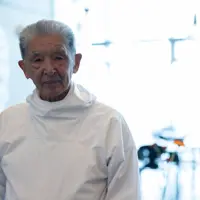
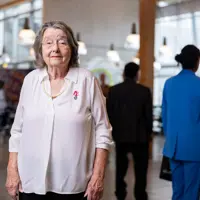
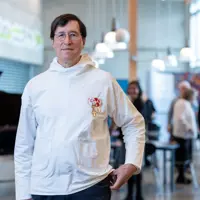
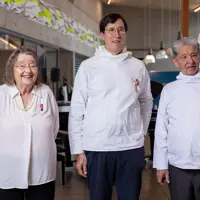
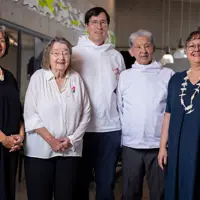
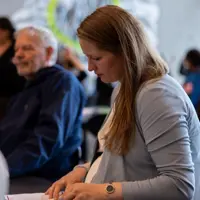
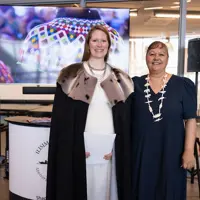
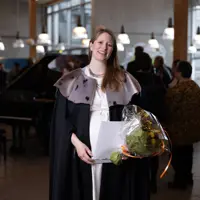
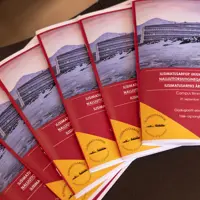

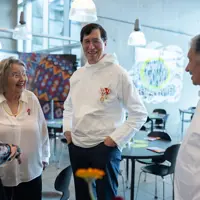
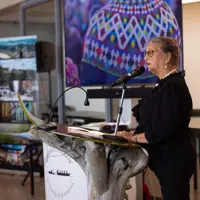
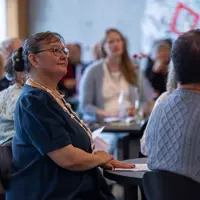
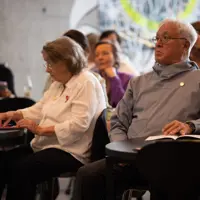
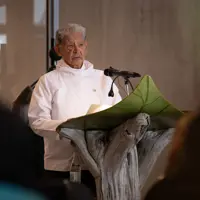
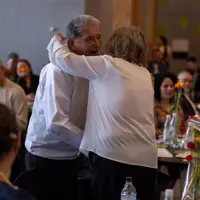
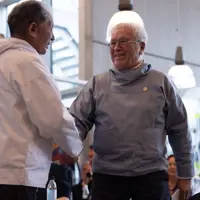
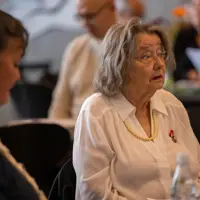

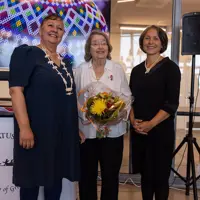
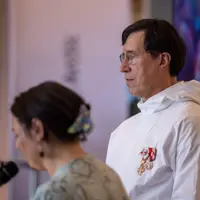
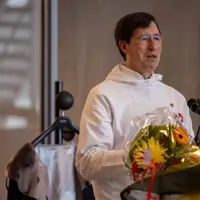
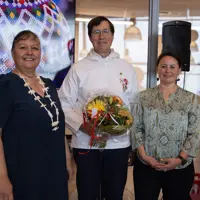
 FACEBOOK
FACEBOOK LINKEDIN
LINKEDIN Copy link
Copy link
